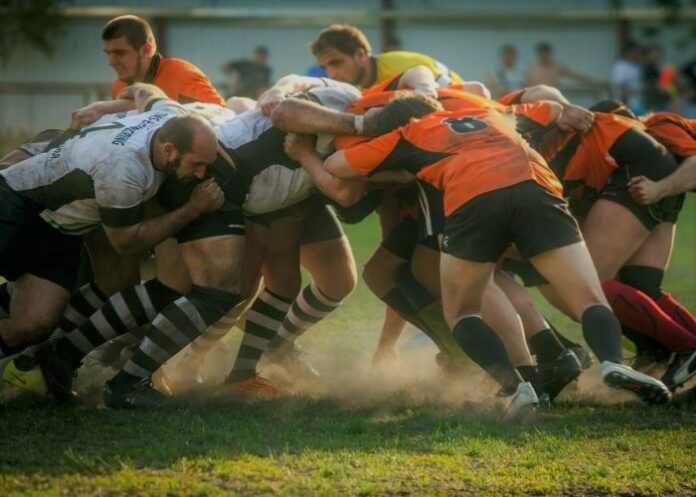Urgent action needs to be taken by rugby bosses to reduce head injuries after a study showing former international players are 15 times more likely to develop motor neurone disease, and three times as likely to get Parkinson’s Disease, said researchers this week (Tuesday 4 October).
Academics studying a group of former Scottish internationals found that, overall, they were about 2.5 times more likely to develop neurodegenerative disease than expected, compared with the general population.
Multiple studies have shown a link between brain injuries and an increased risk of developing neurodegenerative disease, and that ex-professional athletes run a greater risk of developing such conditions, reports News24. Currently, a group of former players is taking legal action against various governing bodies for allegedly failing to protect them from permanent injury.
In this latest research, a team led by the University of Glasgow compared health outcomes among 412 male, Scottish, former international rugby players with more than 1 200 matched individuals from the general population.
The results, published in the Journal of Neurology, Neurosurgery and Psychiatry, showed that while age at death was slightly higher among former players, they were also at higher risk of a neurodegenerative disease diagnosis compared with their matched controls.
The risk varies by sub-type, but not by player position. As well as the higher risk of developing motor neurone disease, the risk of Parkinson’s disease is three times greater.
“This study provides further insight into the association between contact sports and neurodegenerative disease risk,” said team leader Glasgow consultant neuropathologist Willie Stewart.
“Of particular concern are the data on motor neurone disease risk among our rugby players, which is even higher than that for former professional footballers. This finding requires immediate research attention.”
The Motor Neurone Disease Association says the disease affects up to 5 000 adults in the UK at any one time, with a 1 in 300 risk of getting MND across a lifetime.
The researchers said the paper’s findings echo those of previous studies of former professional football players and American football players but point out most of the rugby players studied were amateurs, playing before the sport turned professional in 1995.
They said this showed the risks were not confined to professional athletes.
Professional risks
Stewart, whose previous research showed ex-professional footballers had a significantly higher risk of dying from neurodegenerative disease than the general population, said he was concerned that rugby players faced even more risks in the professional era with an increasing number of matches being played.
“Rugby is doing a lot about head injury management and discussing whether it can reduce impact exposure,’ he said. “But conversations have gone on a while and the pace of progress is pretty slow.”
He added: “Instead of talking about extending seasons and introducing new competitions and global seasons they should be talking about restricting it as much as possible, cutting back on the amount of rugby we’re seeing and getting rid of as much training as possible.”
Stewart said rapid strides had been made in American football, highlighting the reduction in contact training.
“I think rugby could be speeding up this pace of change," he said. “I know it’s tough to think of about there being less rugby rather than more but maybe less is more.
“Maybe you get a better-quality product if the players are less damaged and fitter rather than depending purely on quantity. You can't continue to put young men and women through what they’ve been through now we know from the amateur era there’s this risk of brain disease.”
Motor Neurone Disease Association director of research development Brian Dickie welcomed the report but said research needed to be extended into much larger populations.
“We know most cases of MND involve a complex mix of genetic and environmental risk factors, so the level of genetic risk may be different in high performance athletes compared with the general population,” he said.
Study details
Neurodegenerative disease risk among former international rugby union players
Emma R Russell, Daniel F Mackay, Donald Lyall, Katy Stewart, John A MacLean, James Robson, Jill P Pell, William Stewart.
Published in Journal of Neurology, Neurosurgery and Psychiatry on 4 October 2022
Abstract
Background
Autopsy studies of former contact sports athletes, including soccer and rugby players, frequently report chronic traumatic encephalopathy, a neurodegenerative pathology associated with traumatic brain injury. Nevertheless, little is known about the risk of neurodegenerative disease in these populations. We hypothesised that neurodegenerative disease risk would be higher among former elite rugby union players than the general population.
Methods
We conducted a retrospective cohort study accessing national electronic records on death certification, hospital admissions and dispensed prescriptions for a cohort of 412 male Scottish former international rugby union players and 1236 members of the general population, matched to former players by age, sex and area socioeconomic status. Mortality and incident neurodegenerative disease diagnoses among former rugby players were then compared with the matched comparison group.
Results
Over a median 32 years follow-up from study entry at age 30 years, 121 (29.4%) former rugby players and 381 (30.8%) of the matched comparison group died. All-cause mortality was lower among former rugby players until 70 years of age with no difference thereafter. During follow-up, 47 (11.4%) former rugby players and 67 (5.4%) of the comparison group were diagnosed with incident neurodegenerative disease (HR 2.67, 95% CI 1.67 to 4.27, p<0.001).
Conclusions
This study adds to our understanding of the association between contact sports participation and the risk of neurodegenerative disease. While further research exploring this interaction is required, in the meantime strategies to reduce exposure to head impacts and head injuries in sport should be promoted.
News24 article – Rugby players face highly increased MND risk: disease study (Open access)
See more from MedicalBrief archives:
Brain-injured rugby players lodge class action against global unions
Highest levels yet for concussion rates in elite rugby – union
Professional rugby players’ brains can be affected in single season
Dementia class action likely to force world rugby unions to act

